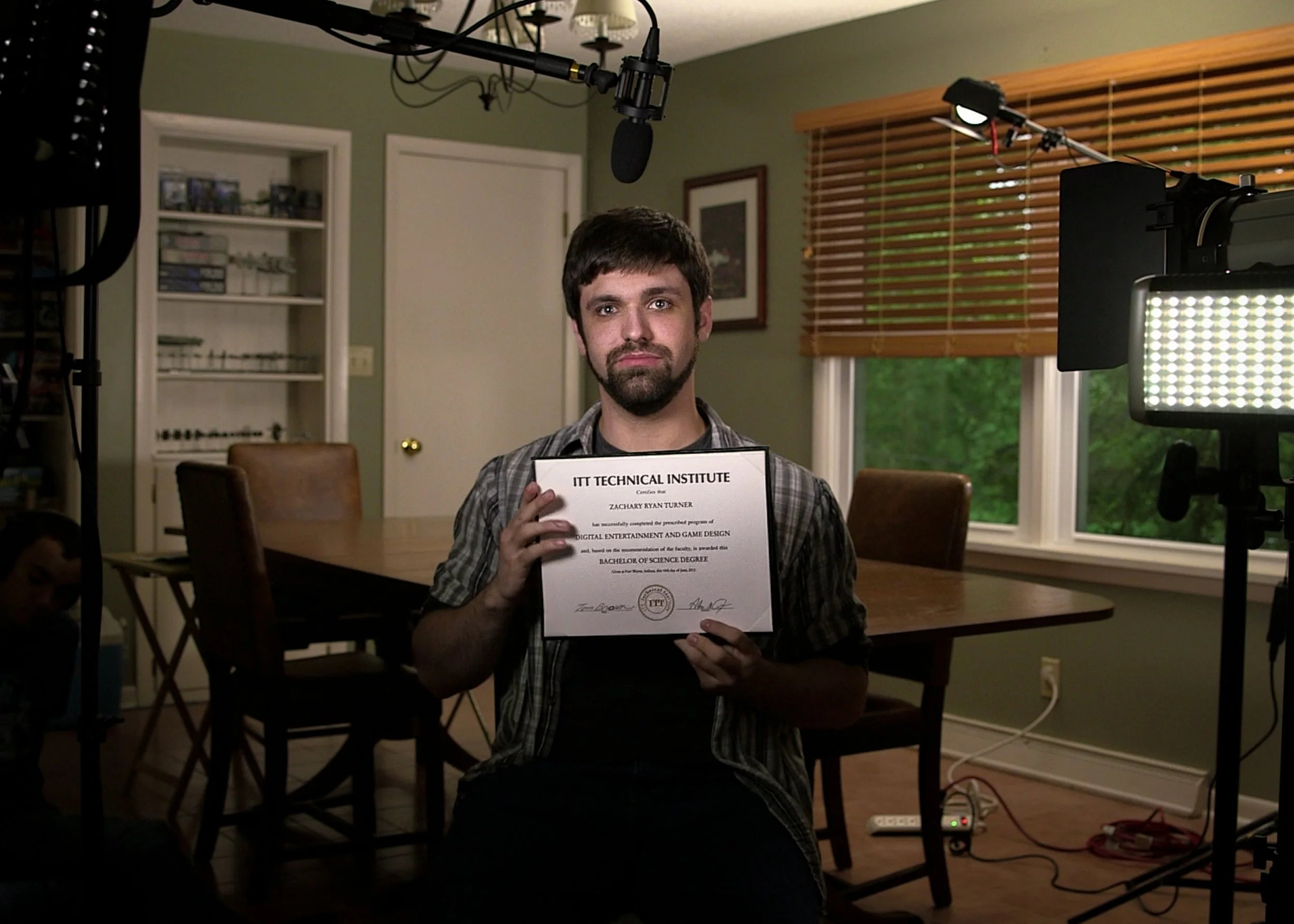Home → Student Stories → Zach Turner
“It wasn’t a school. It was a money factory.”
Zach Turner, ITT Technical Institute in Fort Wayne, Indiana

In 2019, Student Defense partnered with the filmmakers of the award-winning higher education documentary, Fail State, to build “Shattered.” This living database aims to document and maintain the stories of American college students who have had their lives ruined by predatory colleges and universities.
Zach Turner was eight years old when his parents gave him a Nintendo Entertainment System.
“That [console] was my first big introduction into gaming,” Zach recalled in an interview with the Fail State team. He dreamed of one day becoming a video game designer so others could explore his game “universes.” By high school, Zach knew he wanted to go to college and study game design.
During his senior year, Zach searched online for college video game programs in his home state of Indiana. The top result was at a for-profit college, ITT Technical Institute’s Digital Entertainment and Game Design program, an hour’s drive away in Fort Wayne.
After graduating high school, Zach and his mother drove to Fort Wayne and found ITT Tech in a nondescript office complex. They were both surprised by how small the school was, but Zach still went forward with touring the school. Walking through the halls with a recruiter, Zach saw posters highlighting stellar job placement rates and students landing their dream jobs after graduation. Throughout the tour, the recruiter kept emphasizing to Zach and his mother how successful ITT Tech was at placing graduates in meaningful and high-paying careers, especially in the video game industry. To Zach, hearing about the high job placement rates quickly sold him on the school and assuaged his concerns about the underwhelming campus or the high price—$80,000—of an ITT bachelor’s degree.
Zach discusses the posters on the walls at ITT Tech
Zach decided to enroll. Because he had excelled in high school and had high SAT scores, ITT Tech waived his placement exam and immediately accepted him into the program. But his excitement about beginning his college career soon turned to dismay.
Zach knew something was wrong as soon as he started his first class. It was a “professional strategies” course, actually an 11-week introduction to drafting a resume and using Microsoft Office. Zach thought it was strange how rudimentary the class was and how they were stretching it out over an entire term, but he told himself other students likely needed this introduction and he pressed on.
His other courses weren’t any better. In his Adobe Photoshop class, course goals included being able to successfully open the program and start a new document. “These were course goals, not class goals,” Zach angrily remembers. “It felt like the whole [degree program] was designed by someone who had never even seen these programs being put to their full potential.”
Zach discusses the doubt that set in amongst the student body
In one class, Zach remembers being instructed to go to YouTube and watch a video. “That was our entire instruction for the day,” Zach recalls. In another class, the instructor gave Zach and his classmates the answers to their final exam before the test. In many of his classes, textbooks arrived as late as seven weeks into the term. Zach and other students complained to the administration, but nothing changed. “I remember thinking, well, maybe next semester we’ll be getting a class that actually challenges me a little bit, and I remember saying that to myself every semester for two, three, four semesters and after a while I kind of gave up hope that things were going to improve.”
After two years with no improvement, Zach was debating dropping out. But he had already accrued over $40,000 in student loans and was unsure how he was going to pay back that debt without the skills he’d been promised. He stayed enrolled and hoped things would improve in his final two years.
The classes did not improve, and Zach was consumed with growing dread and anxiety. He tried to make the best of his remaining time at school, and formed an independent game design team with his classmates to try and break into the industry themselves, but the mountain of the task was too hard to overcome with student loans looming over his and his classmates’ heads.
When graduation day came, ITT Tech rented a local middle school auditorium to host the ceremony. Zach put on his robe and walked across the stage, forcing a smile as he was handed a diploma he knew would lead him nowhere.
Today, Zach is not working in the video game industry. Instead he works at a fast food restaurant while trying to pay down over $60,000 in student loans. To his knowledge, Zach says only one person from his graduating class was able to secure a job in the video game industry, and that was because the student taught himself programming outside of school. Zach still dreams of becoming a video game designer someday, and spends the little free time he has teaching himself game design.
Zach thinking back on the day he visited ITT Tech for the first time
In 2016, ITT Tech collapsed, shuttering its 130 campuses across the country. ITT Tech had faced years of lawsuits and government investigations over allegations of predatory lending, deceptive marketing, and fraud.
Zach’s full story is featured in the documentary Fail State.
About Student Defense
In 2019, Student Defense partnered with the filmmakers of the award-winning higher education documentary, Fail State, to build “Shattered.” This living database aims to document and maintain the stories of American college students who have had their lives ruined by predatory colleges and universities.
About Fail State
Executive produced by news legend Dan Rather, Fail State is a 2018 feature documentary that investigates the rise of predatory for-profit colleges in American higher education. Fail State debuted in December of 2018 on STARZ.

